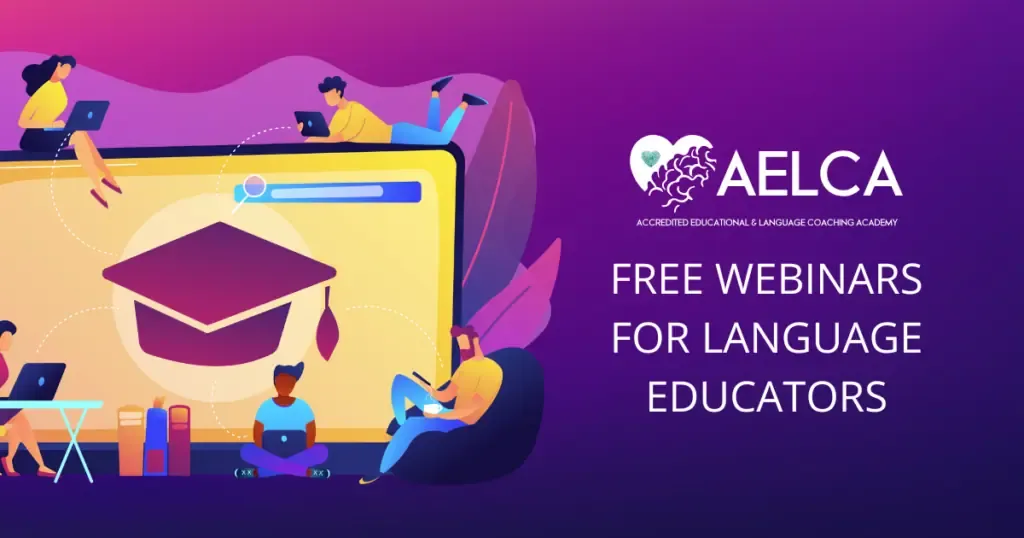
FREE WEBINAR DATES COMING UP...
Please scroll down the page to find the webinar you would like to register for.
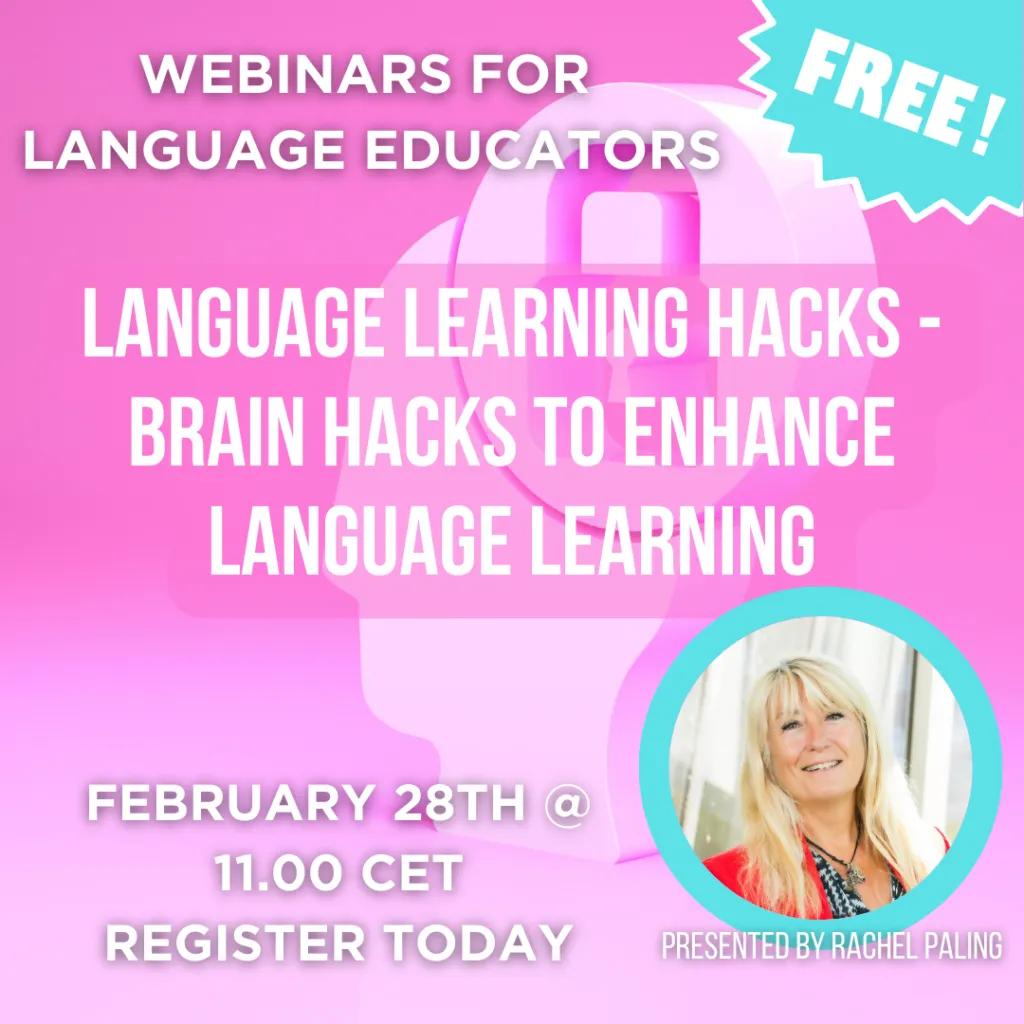

February 28th @ 11:00 CET
Language Learning Hacks - brain hacks to enhance language learning
Is AI Outpacing the Human Touch in Language Learning?
In an era where AI and digital solutions dominate, the urgency to enhance learning and unlock the brain’s potential has never been greater. With learners facing overwhelming workloads, forced study scenarios, and emotional barriers, AI may seem like the easy choice—but what if the most powerful tool is still the human connection?
Join us for an eye-opening webinar where we delve into groundbreaking techniques and cutting-edge research from experts in flow, neuroscience, and pedagogy. Discover how to create a holistic, human-centred approach to language acquisition that leverages both explicit and implicit learning strategies. Learn how to apply neuroscientific principles and coaching methods to deliver key insights, helping learners absorb language faster, more effectively, and with less conscious effort—all tailored to their unique needs.
Unlock the Three Pillars of Language Mastery:
- Immersion: Surround yourself with the language in ways that feel natural and engaging.
- Consistency: Build habits that turn sporadic effort into lasting progress.
- Efficiency: Maximise every minute of learning for optimal results.
Add passion and motivation, and you have a transformative learning experience that AI alone cannot replicate.
Why Attend?
This isn’t just another webinar—it’s your opportunity to explore how the human touch can elevate language learning beyond what algorithms can offer. Whether you’re a coach, educator, or language enthusiast, you’ll leave with actionable strategies to inspire and empower learners like never before.
Ready to revolutionise the way you teach or learn languages?
Secure your spot today and be part of the conversation that bridges science, coaching, and real-world impact.
We can’t wait to see you there!
Use the form below to register...
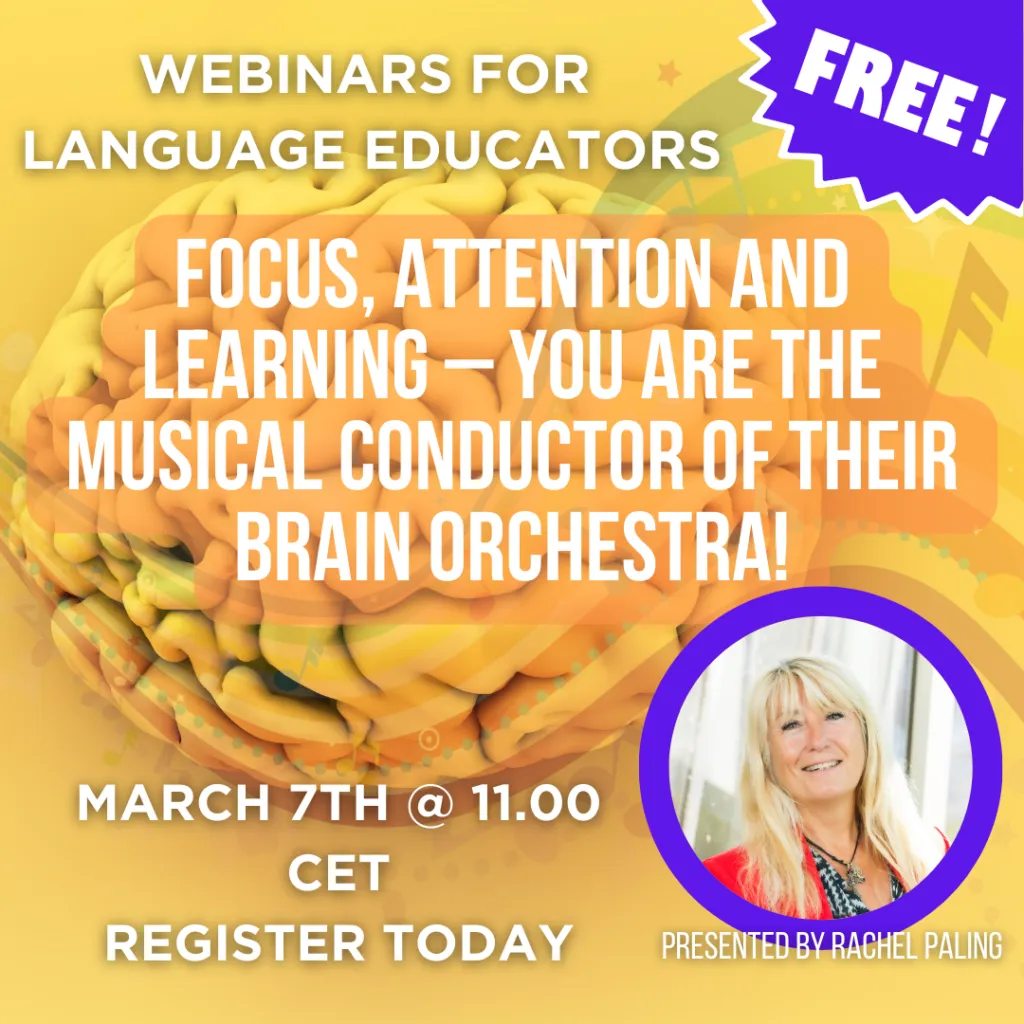

March 7th @ 11:00 CET
Focus, Attention and learning – You are the musical conductor of their brain orchestra!
Master the Art of Focus: Conduct Your Brain’s Learning Symphony
Are distractions derailing your language learning progress—or that of your learners? In a world full of interruptions, the ability to harness focus and attention is the secret weapon for effective learning.Join us for an immersive webinar where we explore the neuroscience of attention and reveal how Neurolanguage Coaching® can transform the way you—or your learners—engage with language. Think of yourself as the conductor of a brain orchestra: every note, every rhythm, and every pause is an opportunity to fine-tune focus and amplify learning.
What You’ll Discover:
- The Science of Attention: Uncover how your brain processes focus and how to leverage its natural mechanisms for peak performance.
- Practical Strategies: Walk away with actionable techniques to create an optimal learning environment, minimise distractions, and sustain concentration.
- Brain-Friendly Methods: Learn how to apply neuroscience-backed approaches to keep attention sharp and learning efficient.
Why This Webinar?
This session is designed for coaches, educators, and learners who want to turn scattered focus into laser-sharp concentration. Whether you’re guiding others or mastering a language yourself, these insights will help you—and your learners—achieve more in less time.Ready to take control of your learning experience?
Reserve your place now and become the conductor of your brain’s full potential. Let’s make every learning session count!Use the form below to register...
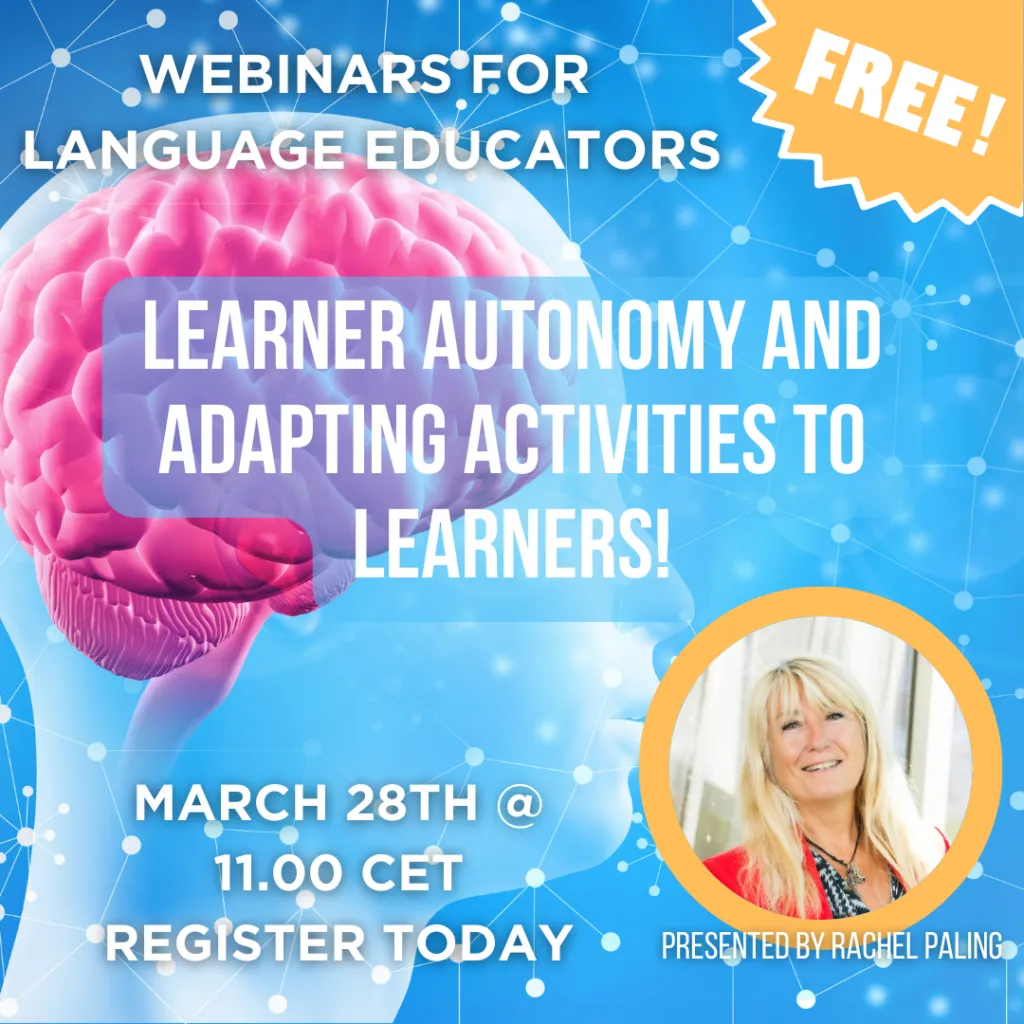

March 28th @ 11:00 CET
Learner Autonomy and adapting activities to learners!
Empowering Learner Autonomy: Adapting to the Unique Brain of Every Learner
What if the key to transformative language learning lies in honouring the individuality of each learner’s brain? Over the last 50 years, the landscape of learner autonomy has evolved dramatically—shaped by advances in neuroscience, shifts in educational theory, and the changing needs of learners themselves. But how can we bridge the gap between scientific insight and personalised learning?In this thought-provoking webinar, we will trace the journey of learner autonomy, from the foundational principles of Self-Determination Theory to the dynamic frameworks of Intentional Change Theory. We’ll examine how learners, brains, and teaching methods have adapted—and why today’s educators must evolve alongside them.
What We’ll Explore:
- Beyond the Neuromyths: Move past outdated concepts like “learning styles” and embrace the science of learning to understand what truly drives effective, individualised instruction.
- The Art of Adaptation: Discover how to tailor activities to the unique needs, preferences, and cognitive profiles of your learners, fostering genuine autonomy and engagement.
- Coaching for Autonomy: Learn how Professional Coaching techniques can create a dialogue with learners, empowering them to take ownership of their journey through choice, preference, and self-directed growth.
Why Join Us?
This webinar is for educators, coaches, and language professionals who are ready to move beyond one-size-fits-all approaches. By integrating neuroscience with coaching principles, you’ll gain the tools to design learning experiences that respect the uniqueness of every brain—and unlock the full potential of every learner.Ready to redefine how you teach—and how your learners thrive?
Secure your spot and be part of the movement that puts autonomy at the heart of language acquisition. Let’s build a future where learning is as unique as the minds we nurture.Use the form below to register...
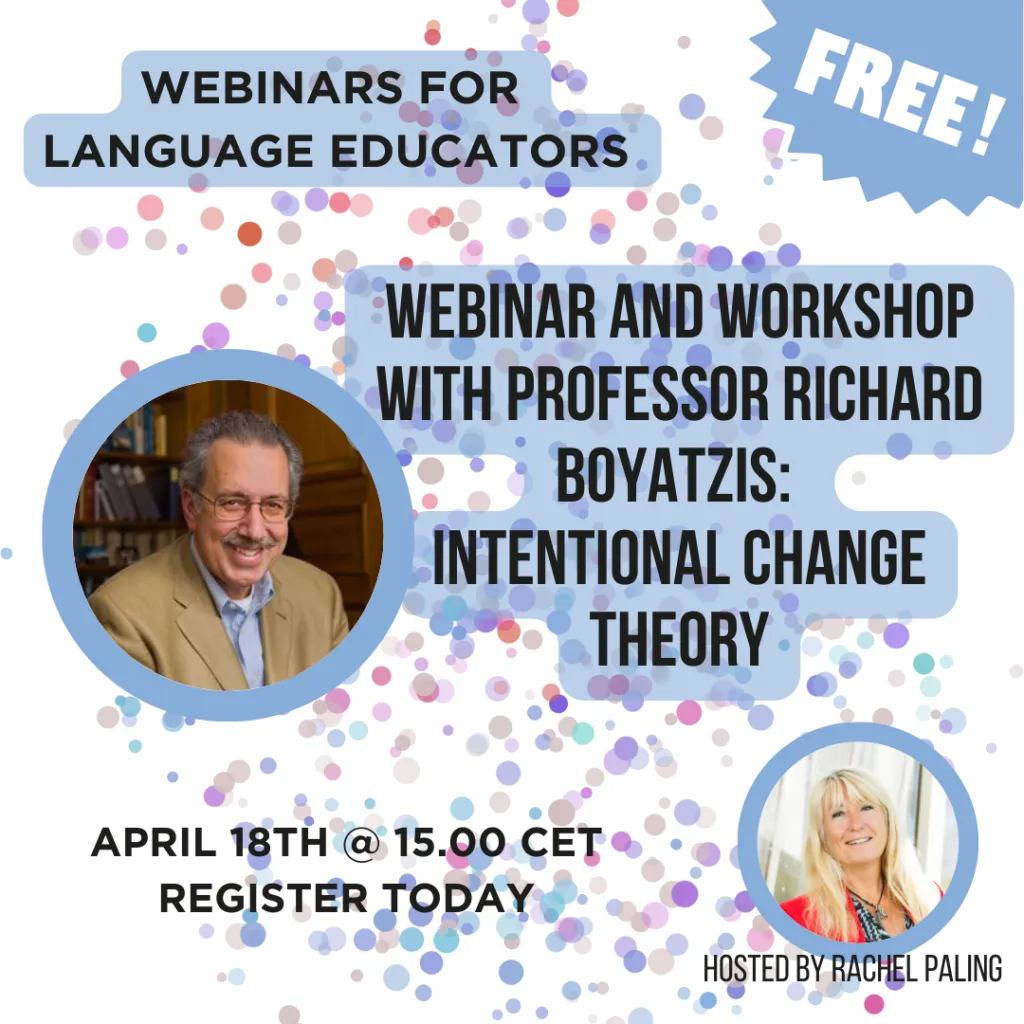

April 18th @ 15:00 CEST
Webinar and Workshop Extraordinaire with Professor Richard Boyatzis
Exclusive Webinar/Workshop with Prof. Richard Boyatzis: The Practical Power of Intentional Change Theory
We are honoured to welcome Prof. Richard Boyatzis, one of the most cited and influential scholars globally, for a transformative session on the practical applications of Intentional Change Theory.
In his groundbreaking book, The Science of Change, Prof. Boyatzis challenges conventional wisdom—demonstrating that lasting change is not driven by rigid goal-setting, linear planning, or problem-solving alone. Instead, his decades of research in neuroscience and complexity theory reveal that vision, purpose, and the Ideal Self are the true catalysts for hope, motivation, and sustainable growth. Yet, educators often overlook the Ideal Self, defaulting to a focus on the “ought self.”
In this session, Prof. Boyatzis will delve into the dynamic interplay between the “Ideal Self” and the “Real Self”, illustrating how our communication as educators can trigger either Positive Emotional Attractors (PEA) or Negative Emotional Attractors (NEA)—with profound physiological effects on learners.
To Maximise Your Experience: We recommend reviewing Chapter 2 (Dreams, Shared Vision, and Purpose) and Chapter 4 (The Real Self) from The Science of Change in advance.
Join us for an unmissable opportunity to learn from a pioneer in the science of human development. Reserve your place today.
Use the form below to register...
More dates for webinars coming soon
Is there a webinar subject you would like to see again? Is there a subject that would help you? Perhaps a subject we haven’t covered. We’d be delighted to hear your feedback on what webinar subjects would help you most. Please email the team at [email protected] with your suggestions.